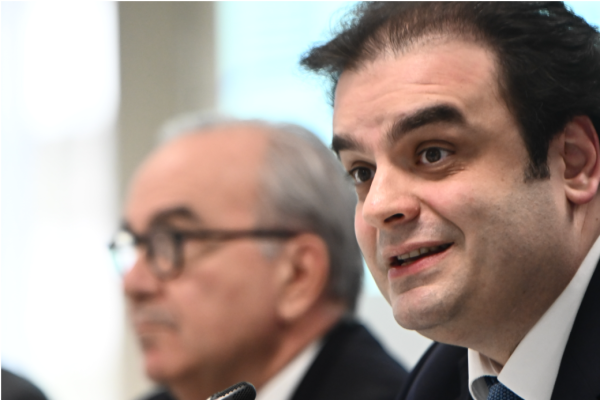
The blow to the optimism for a more positive post-pandemic normality, due to the growing financial uncertainty, is recorded by the latest survey of the EY “Future Consumer Index”, with the data showing that consumer confidence is shaken once again.
In particular, the ninth edition of the quarterly global survey of 18,000 consumers found that rising costs of goods and services affect the purchasing power and decisions of 52% of respondents worldwide.
While, inevitably, rising prices affect low-income people (62%) more, research shows that both middle-income (48%) and high-income people (42%) are also under pressure. Emerging economies are under intense pressure, with 62% of consumers coming from them saying that price affordability affects their choices, compared with 45% of respondents in developed markets.
In light of significant inflationary pressures on prices and concerns about new variants of COVID-19, research shows that consumers will continue to limit their consumer spending, switch to cheaper alternatives and limit the purchase of non-essential goods. Some commodities for which respondents spend less include clothing (38%), toiletries and cosmetics (35%), and alcohol (30%). At the same time, many are already looking for cheaper alternatives for fresh (20%) and packaged foods (19%).
Uncertainty about managing the rising cost of living drives nearly two-thirds (60%) of respondents into the mood for greater savings in the future, with 39% already aiming to save rather than spend.
“Experiences” are what determine costs
In addition, research shows that consumers are looking for experiences more than ever, as they make up for lost time and find ways to escape the pressures of the post-pandemic world, with 45% saying they intend to live more intensely at all times.
Of the top five consumer prioritization categories – “Planet first”, “Affordability first”, “Experience first”, “Health first” and “Society first ”- experiences have increased the most, by twice as much as in 2020, and are, today, the third highest priority of consumer spending, from the last place where they were at the beginning of the pandemic.
42% of all respondents plan to spend more money on experiences next year. However, 39% say they are less willing to seek out-of-home experiences. Consumers seeking out-of-home experiences demand more from physical stores, as more than a third (36%) plan to visit only stores that offer a great consumer experience.
Sustainability and values influence consumer decisions
When it comes to consumer decisions, for the second consecutive quarter, most respondents put the planet (26%) above affordability (24%) and experience (20%).
Consumers choose to make more sustainable purchases, doing what they can to protect the environment, with 56% saying they will pay more attention to the environmental impact of their markets and 52% saying they are committed to paying more attention to social their impact. Two in five (42%) say they will only buy from brands that align with their values, a view shared by Generation Z and even higher (48%) Millennials.
Commenting on the findings of the new edition of the survey, Mr. Thanos Mavros, Partner in the Consulting Services Department of EY Greece and Head of Consumer Products and Retail of EY in Southeastern Europe, said: pandemic and geopolitical developments continue to influence consumer choices. Consumers, seeing their purchasing power shrink, restrict purchases of non-essential goods. At the same time, however, the number of consumers who place experience above the good or service they buy is increasing, while sustainability remains the dominant purchasing criterion. In this fluid environment, companies worldwide and in Greece will have to adapt their strategy to the different expectations of consumers and closely monitor the market, in order to identify – or even predict – the trends that will prevail in the near future “.
Latest News

Athens to Return Confiscated License Plates Ahead of Easter Holiday
Cases involving court orders will also be excluded from this measure.

Servicers: How More Properties Could Enter the Greek Market
Buying or renting a home is out of reach for many in Greece. Servicers propose faster processes and incentives to boost property supply and ease the housing crisis.

Greek Easter 2025: Price Hikes on Lamb, Eggs & Sweets
According to the Greek Consumers’ Institute, hosting an Easter dinner for eight now costs approximately €361.95 — an increase of €11 compared to 2024.

FM Gerapetritis Calls for Unified EU Response to Global Crises at EU Council
"Europe is navigating through unprecedented crises — wars, humanitarian disasters, climate emergencies," he stated.

Holy Week Store Hours in Greece
Retail stores across Greece are now operating on extended holiday hours for Holy Week, following their Sunday opening on April 13. The move aims to accommodate consumers ahead of Easter, but merchants remain cautious amid sluggish market activity.

Green Getaway Ideas for Easter 2025 in Greece
Celebrate Easter 2025 in Greece the sustainable way with eco-farms, car-free islands, and family-friendly getaways rooted in nature and tradition.

Civil Protection Minister Details Summer Firefighting Plans at Delphi Forum
At the 10th Delphi Economic Forum, Minister of Climate Crisis and Civil Protection Yiannis Kefalogiannis discussed Greece's plans for the upcoming fire season.

How Shops and Markets Will Operate During Easter Holy Week
The Easter holiday schedule has been in effect since April 10, with retail stores open Palm Sunday, and most supermarkets also operating to meet consumer demand for Easter shopping

Why Is the French Aircraft Carrier Charles De Gaulle in Piraeus?
Docking in Piraeus after a four-month deployment in the Indo-Pacific region, the admiral of the aircraft carrier the Charles de Gaulle says, "Greece is our best partner in the Mediterranean."

Riots and Vandalism in Downtown Athens Exarcheia Region
Night of unrest in downtown Athens' region of Exarcheia – 11 Cars Burned, 72 Detentions









































 Αριθμός Πιστοποίησης
Αριθμός Πιστοποίησης